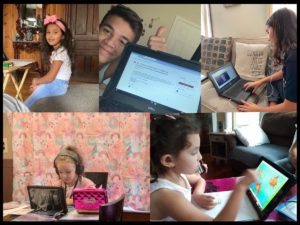Atlantis Provides Support for Families and Teachers Navigating Remote Learning
 Technology can pose challenges for anyone – even for the most tech-savvy among us. Some teachers, students and parents face a steep learning curve as they navigate the ins and outs of their Google Classroom, Google Meets, and various other educational platforms and programs. Then there is the internet. Is it fast enough? Do you have a reliable connection?
Technology can pose challenges for anyone – even for the most tech-savvy among us. Some teachers, students and parents face a steep learning curve as they navigate the ins and outs of their Google Classroom, Google Meets, and various other educational platforms and programs. Then there is the internet. Is it fast enough? Do you have a reliable connection?
Atlantis provided every student with a new Chromebook laptop or tablet this fall, thanks to a technology grant from the Commonwealth of Massachusetts. But even with new devices, problems can still arise. Atlantis is meeting these technology challenges head-on with the help of Melissa Biello and Mary-Beth Souza. While not new to Atlantis, both are taking on new roles this school year to help make remote learning less daunting for everyone.
Technology Integration Specialist
When Atlantis went fully remote in the spring, 2nd grade teacher Melissa Biello and her students were ready. They had been using Google Classroom in class, so it was familiar to them when remote learning began. That gave Biello an idea.
“Sometimes teachers want to use technology, but they don’t always have time to learn how to use a program, or figure out what program to use,” Biello said. “I approached the site leaders and said we need someone with an educational background, such as a teacher, to figure out the best way to utilize the technology available to engage students and enhance student learning.”
The site leaders agreed and Biello took on the newly created position of Technology Integration Specialist. Working alongside IT Manager Mike Dauphin, Biello’s job is to figure out how to implement technology within the classroom and throughout the curriculum and to help students and teachers utilize it to its full potential in a way that is best for student learning.
Right now, Biello spends a lot of time providing technical support to students, families and teachers, and troubleshooting problems. Biello has her own tech support number, in addition to her email, and she gets questions from teachers and families all day long.
Parent Erin Cidade reached out to Biello because her daughter had trouble signing into a program assigned by her teacher.
“Ms. Biello tried to solve the problem virtually and when that didn’t work she took the time to meet with us at the school,” said Erin Cidade, 2nd grade parent. “The problem was solved, and my daughter was able to go into the program with ease. It is good to know that we have the support we need should technology problems arise.”
Sign-in problems, difficulty connecting to a home network, device malfunctions, and insufficient bandwidth or network speed are some of the most common problems Biello has encountered. The latter can occur when too many people are using the network at the same time.
“Many people don’t realize that for a connected Chromebook to actually work for class, you need to take out some of the network traffic,” said Biello. “I’m talking to parents and explaining how networks work and sharing some best practices for connectivity.”
Fast, reliable internet access
Biello says data from Google Meets can identify students who are having internet connectivity issues. She refers those families to K-12 Attendance Officer Mary-Beth Souza who discusses options for families to increase their network speed and get a better internet connection.
Atlantis has partnered with Comcast and T-Mobile to make sure students have access to fast, reliable internet service. Through the partnerships, Atlantis is able to provide families in need with internet through Internet Essentials from Comcast, or T-Mobile hot spots.
Souza helps families apply for Internet Essentials, a program that has been connecting low-income Americans with low-cost, high-speed internet at home since 2011. Families that meet Comcast’s eligibility requirements receive a promo code to set up the service and Atlantis sponsors those families, covering the cost of the internet until next September.
Some students do not take part in remote learning at home. They may go to work with their mom or dad, or they may go to a babysitter’s house. T-Mobile hot spots are a better option for these families because students can access WiFi from anywhere. Atlantis has a 2-year contract for each hot spot and is providing families that need it with a hot spot for a year. If the family no longer requires the service at the end of the year, Atlantis can give it to another student for year two.
“We are already seeing some positive results from our efforts,” said Souza. “We had students that could not log in for classes because their internet was too slow, but once we transferred their service to Internet Essentials or provided them with a T-Mobile hot spot, student attendance in those cases improved. I’m grateful for the opportunity to give back to our families. We want to make sure they have what they need to get though the school year. That’s the most important part.”
Working through it together
Souza recognizes that circumstances for a family can change month to month or even week to week, so she plans to continue to work with families through the end of the school year to make sure they get help if they need it.
Biello, meanwhile, says don’t be afraid to make mistakes. “It’s a learning curve, and everyone is learning,” Biello said. “It’s OK to feel frustrated. Technology doesn’t work 100 percent of the time. But don’t be afraid to step outside of your comfort zone because that’s how we learn.”